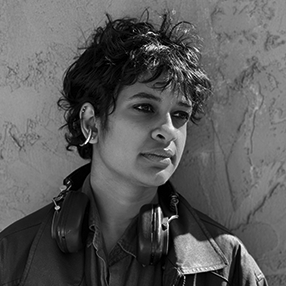You must convince yourself
you know better than life. You know better
than soot or algae’s wet sigh. And the child
you might’ve had or been,
who drank brine and left
the olives jarred.
He would draw the lines, would mark
the years himself. He’s never seen
the vines that, unlooked for
for centuries, sparred the light
for the windows and won.
Now to open the grate
you have to unhook the ground
from the ground.
Most days you leave it be.
You allow what can survive you.
Whatever of you can survive.
Rarely you notice
some trace of your body, which,
in your absence, continues.
As debt continues.
Rot, the house, a buzzing shadow
from the screen door to the bedroom so
thick the flies split or are shunned
and go to corners to die.
They die in pairs. People bristle from you
on the street, if they look.
The truck driver exhales flat smoke
and it breathes into a keyhole.
You plod past a little boy wearing
a red dress and he nods at you,
tips his horns of red felt.
Copyright © 2024 by Gaia Rajan. Originally published in Poem-a-Day on July 22, 2024, by the Academy of American Poets.
“Utopia is a violent fiction: to imagine a past coherence confines us to a perpetual state of self-purification, corrosive not so much to our fallibility as our humanity. Injury, degeneration, drift—what might it mean to envision these terms, not as markers of the proliferating impossibility of a good future, but as alternate methods of negotiating the present? A forbearance, to learn to desire rupture rather than its illusory prehistory.”
—Gaia Rajan

